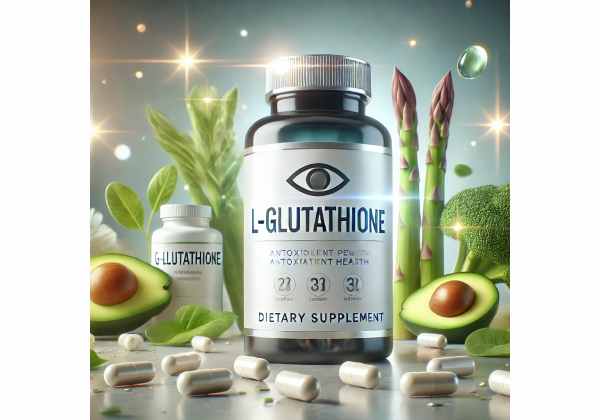
L-Glutathione is often celebrated for its powerful antioxidant properties and its capacity to enhance overall cellular function. Yet, many individuals remain unaware that this compound can also significantly impact vision. By protecting delicate structures within the eye from oxidative stress and aiding in the detoxification process, L-Glutathione helps preserve visual sharpness and comfort. In this comprehensive guide, we investigate how L-Glutathione Improves Vision, discuss its essential roles in Eye Health, and provide practical tips for maximizing its benefits. Whether you’re seeking to strengthen your ocular well-being or slow the onset of age-related vision decline, L-Glutathione can be an invaluable addition to your wellness routine.
Table of Contents
- Understanding L-Glutathione: A Foundation for Visual Wellness
- How L-Glutathione Enhances Optical Function
- Essential Reasons to Consider L-Glutathione for Stronger Eyesight
- Practical Ways to Use L-Glutathione for Improved Vision
- Investigations and Scientific Perspectives
- Commonly Asked Questions About L-Glutathione
- References and Sources
Understanding L-Glutathione: A Foundation for Visual Wellness
L-Glutathione is a tripeptide composed of three amino acids: cysteine, glutamate, and glycine. It exists in nearly every cell of the human body, acting as a detoxifier, an antioxidant, and a supporter of healthy metabolic processes. Although the liver naturally produces glutathione, various factors—such as aging, chronic illness, malnutrition, and environmental toxins—can diminish its levels over time.
Why L-Glutathione Matters in Eye Health
Healthy eyes demand an array of nutrients, alongside robust protection from free radicals and oxidative damage. The lens, retina, and macula are especially vulnerable to reactive oxygen species (ROS) because they are highly active tissues that rely on consistent oxygen supply. Elevated ROS levels can lead to conditions like cataracts, macular degeneration, and other age-related vision impairments. By stabilizing free radicals and supporting cellular repair mechanisms, L-Glutathione provides a crucial line of defense.
Biosynthesis and Regulation
The body synthesizes glutathione in a two-step, enzyme-dependent process. Though many cells have the capacity to produce it, certain tissues—liver cells, for example—act as glutathione “factories,” exporting it to other organs and systems when levels are optimal. However, when ongoing oxidative stress depletes glutathione faster than the body can replenish it, deficits ensue. These deficits may show up as elevated inflammation, slower tissue repair, and an increased susceptibility to various ailments, including eye disorders.
Dietary and Supplemental Sources
Foods naturally rich in the amino acids required for glutathione production include eggs, meat, dairy, nuts, and legumes. Sulfur-containing vegetables such as broccoli, Brussels sprouts, and garlic also provide key building blocks. Nonetheless, certain populations—particularly older adults or those with poor absorption—might need additional supplementation. Over the past few decades, L-Glutathione supplements have emerged as a popular choice for fortifying the body’s antioxidant capacity.
Forms of L-Glutathione
Supplemental glutathione comes in various forms, each with unique absorption profiles:
- Reduced Glutathione (GSH): The biologically active form, prized for its high bioavailability and direct antioxidant activity.
- Liposomal Glutathione: Encapsulated in liposomes for potentially enhanced absorption, protecting glutathione from degradation in the gastrointestinal tract.
- Acetylated Glutathione: Modified chemically to improve stability and intracellular uptake, though opinions differ on its efficacy.
An Integrative Eye-Care Approach
Understanding L-Glutathione’s broad physiological importance sets the stage for appreciating its role in ocular health. By buttressing the body’s natural detoxification processes, mitigating inflammation, and fortifying antioxidant defenses, glutathione can offer a multifaceted approach to caring for the eyes—one that fits seamlessly into holistic wellness strategies emphasizing balanced nutrition, regular exercise, and stress management.
How L-Glutathione Enhances Optical Function
L-Glutathione plays a pivotal role in maintaining visual acuity, adapting to changes in light, and preventing long-term damage within ocular structures. By focusing on three key pillars—antioxidant defense, cellular detoxification, and supporting enzyme activity—this molecule directly and indirectly keeps eyes functioning smoothly.
1. Neutralizing Free Radicals in the Retina
The retina’s photoreceptor cells are critical for converting light into neural signals. Their metabolic intensity, coupled with high oxygen demand, makes them targets for free radical attacks. L-Glutathione stands as a frontline defender, hunting down these reactive species and converting them into less harmful molecules. When retina cells remain intact and healthy, they transmit clearer signals to the brain, ensuring sharper vision.
2. Preserving Lens Transparency
Protein aggregation in the lens contributes to cloudiness or opacity—early indicators of cataract formation. L-Glutathione’s antioxidant properties guard against protein cross-linking and oxidation. Studies suggest that individuals with higher lens glutathione levels tend to exhibit a reduced risk of cataracts. By helping to maintain the lens’s structural integrity, glutathione upholds clarity and focus.
3. Enhancing Ocular Blood Flow
Adequate blood supply to the eye delivers oxygen and nutrients while removing metabolic byproducts. Abnormal oxidative stress can compromise the endothelium lining blood vessels, leading to restricted blood flow. Glutathione helps sustain endothelial cell function by detoxifying free radicals, thus supporting smoother circulation into the smallest capillaries of the eye.
4. Boosting Regeneration in Eye Tissues
Healthy eyes engage in constant repair and regeneration, relying on efficient cellular turnover. Glutathione assists by stabilizing the redox balance inside cells, ensuring that the environment is primed for normal growth and repair. This effect extends to the epithelial cells on the lens surface, which replace themselves over time.
5. Dampening Chronic Inflammation
Inflammatory markers can rise due to environmental stressors, infections, or underlying chronic conditions. Over time, persistent inflammation undermines ocular health, possibly accelerating the onset of retinal damage and macular degeneration. Glutathione helps modulate inflammatory cytokines and pathways, reducing the burden on sensitive structures inside the eye.
6. Shielding Against Blue Light Damage
The modern world is saturated with digital screens that emit high-energy visible (HEV) or “blue” light. Prolonged exposure can generate oxidative stress in retinal cells. Although wearing protective eyewear or limiting screen time is often advised, L-Glutathione’s antioxidant support can fortify the retina’s resilience, lessening the cumulative impact of blue light on vision over time.
7. Partnering with Other Antioxidants
Glutathione synergizes effectively with vitamins C and E, selenium, alpha-lipoic acid, and other antioxidants. It helps regenerate oxidized vitamin C and E back to their active forms, maximizing an entire network of protective compounds. The interplay among these nutrients ensures a more comprehensive shield against everyday oxidative challenges.
By reinforcing retinal stability, aiding in lens transparency, promoting healthy circulation, and mitigating long-standing inflammation, L-Glutathione offers a robust framework for vision maintenance. Its diverse modes of action illustrate why many holistic health practitioners highlight glutathione as a cornerstone of ocular wellness strategies.
Essential Reasons to Consider L-Glutathione for Stronger Eyesight
Growing numbers of individuals explore L-Glutathione Eye Health protocols to bolster clarity, comfort, and overall visual longevity. If you are contemplating adding glutathione to your supplement arsenal, it helps to understand its top-tier benefits and the circumstances that make it particularly valuable.
- Defense Against Accelerated Aging
The eye’s aging process can be exacerbated by chronic oxidative stress. Over decades, cumulative micro-damage can lead to cataracts, macular degeneration, or generalized loss of sharpness. By quenching free radicals, L-Glutathione helps safeguard ocular tissues from age-related breakdown. - Support for Cataract Prevention
One of the earliest documented roles of glutathione in eye health was its link to lens clarity. Researchers discovered that individuals with healthy lens glutathione levels had fewer incidences of cataract formation. As a preventive measure, maintaining robust glutathione levels may decelerate or mitigate lens opacification. - Potential Aid for Glaucoma Management
While not a standalone therapy, L-Glutathione may be beneficial in managing glaucoma due to its neuroprotective and anti-inflammatory attributes. Elevated intraocular pressure damages the optic nerve over time, and any compound that supports nerve health by reducing oxidative stress could serve as a valuable adjunct. Of course, consistent professional medical supervision is essential. - Enhanced Day-to-Day Visual Comfort
Modern life demands frequent shifts in focus and exposure to artificial lighting—conditions that increase strain on the ciliary muscles and the retina. By ensuring the ocular environment remains balanced and resilient, glutathione can help reduce dryness, eye fatigue, and difficulty adjusting between varying light intensities. - Detoxification and Reduced Toxic Burden
Pesticides, pollutants, and other toxins sometimes accumulate in bodily tissues, including the eyes. Glutathione is integral to Phase II liver detoxification pathways, which help in excreting harmful substances. Higher systemic glutathione levels can thus indirectly defend the eyes by reducing the internal load of damaging substances. - Synergy with Eye-Friendly Nutrients
Glutathione stands as a complementary agent when paired with recognized eye-supportive nutrients like lutein, zeaxanthin, zinc, and vitamin A. When used in tandem, these micronutrients can produce an amplified protective effect on macular integrity, photoreceptor function, and corneal health. - Holistic Antioxidant Strategy
While short-term solutions focus on symptomatic relief, a lasting strategy addresses the root causes of vision decline, including oxidative stress and nutrient deficiencies. Glutathione is especially critical because it supports the entire antioxidant network, thereby amplifying the efforts of other nutrients and lifestyle factors. - Possible Improvements in Night Vision
Although not conclusive, anecdotal reports and some early studies suggest that improved oxidative balance may aid night vision by keeping rod cells healthy. For people who find it challenging to see in dim conditions or adapt to sudden bright lights, consistent glutathione supplementation could lead to gradual enhancements. - Suitability for Various Age Groups
Glutathione supplementation is commonly sought out by middle-aged and older adults. However, it can also be relevant for younger people with intense digital device usage, ensuring that ocular tissues receive protective support against environmental stressors from an earlier stage in life.
By considering L-Glutathione for Vision Improvement, you are effectively investing in a multi-pronged approach that encompasses prevention, daily relief, and synergy with other beneficial nutrients. Although individual results vary based on genetics, dietary habits, and current health status, the fundamental advantages of glutathione in ocular maintenance are widely recognized among integrative health experts.
Practical Ways to Use L-Glutathione for Improved Vision
Optimizing your L-Glutathione intake entails paying attention to product quality, dose strategies, and lifestyle considerations. While dosing can differ between individuals, certain overarching guidelines can ensure you maximize the potential benefits for your eyes.
1. Selecting the Right Form
- Reduced Glutathione (GSH): Many experts favor this form for its immediate availability in the body.
- Liposomal Glutathione: If you’re concerned about gastrointestinal degradation, liposomal preparations might enhance stability and absorption.
- Glutathione Precursors: Another route is supplementing with N-acetylcysteine (NAC), glycine, or cysteine-rich foods, empowering your body to synthesize glutathione internally.
2. Recommended Dosage Ranges
Typical daily dosages for glutathione supplementation fall between 250 and 1,000 milligrams, though therapeutic protocols may suggest higher amounts under professional guidance. Factors like age, oxidative stress level, and general health can influence dose. A safe approach for those new to supplementation is to start with a moderate intake—around 300–500 mg per day—and reassess based on how one feels.
3. Timing and Administration
- Empty Stomach vs. Meal: Opinions differ. Some prefer taking glutathione with meals for better tolerance, while others suggest an empty stomach to potentially boost absorption.
- Splitting Doses: Splitting your daily dose into morning and evening can maintain more consistent glutathione levels. This approach also helps you gauge your tolerance gradually.
4. Pairing with Complementary Nutrients
- Vitamin C: This classic antioxidant can support the recycling of oxidized glutathione back to its reduced form, prolonging its usefulness.
- Vitamin E and Selenium: Both can work synergistically with glutathione to strengthen intracellular protection.
- Carotenoids (Lutein, Zeaxanthin): These specialized pigments guard the macula from blue light damage, working alongside glutathione’s broader antioxidant action.
5. Lifestyle Enhancements
- Mindful Nutrition: Supplementation is most effective when paired with a diet rich in sulfur-containing vegetables, fresh fruits, lean proteins, and whole grains.
- Exercise: Moderately intense physical activity can elevate endogenous glutathione levels. However, excessive or strenuous exercise without proper recovery may temporarily deplete antioxidant stores.
- Screen Hygiene: Regular breaks, appropriate brightness settings, and ergonomic adjustments can reduce digital strain and preserve the beneficial effects of glutathione.
6. Monitoring Progress
Keep a simple journal documenting any improvements in vision—such as reduced glare sensitivity, fewer episodes of dryness, or better adaptation from bright to dark environments. These self-assessments help you fine-tune your supplementation routine. Annual or semi-annual eye exams can also quantify progress in ocular pressure, lens clarity, or macular thickness.
7. Addressing Special Conditions
- Chronic Illness: Individuals dealing with diabetes, autoimmune conditions, or neurodegenerative diseases may have unique glutathione needs. Consult a healthcare practitioner for personalized dosing and potential interactions.
- Medication Considerations: Certain drugs, including some chemotherapeutic agents, can influence how the body processes glutathione. Always discuss your supplementation plans with a medical professional.
8. Long-Term Commitment
The beneficial effects of glutathione often emerge over weeks or months of consistent use. Rather than seeking immediate dramatic changes, approach supplementation as a pillar of your daily health strategy, integrated with restful sleep, balanced meals, and conscientious stress management.
By implementing these practical techniques, you can tailor L-Glutathione supplementation to suit your lifestyle and ocular priorities. In synergy with other healthy habits, consistent glutathione intake can help sustain clear vision and robust eye health for years to come.
Investigations and Scientific Perspectives
As the role of L-Glutathione in Eye Health garners more interest, researchers continue to probe its mechanistic functions and clinical applications. While many studies remain preliminary, the findings underscore glutathione’s profound value for those concerned with preserving or enhancing vision.
1. Population Studies on Cataract Incidence
Several observational studies link lower levels of ocular glutathione with an increased risk of cataracts in older adults. Certain trials note that those who maintained higher dietary intakes of glutathione precursors had comparatively reduced lens opacity progression. While not conclusive proof of causality, these associations highlight glutathione’s significance in lens clarity.
2. Animal Models Exploring Retinal Protection
Animal-based experiments demonstrate that administering glutathione or its precursors can curb free radical damage in retinal tissues. For instance, in rodent models subject to artificially induced oxidative stress, consistent glutathione supplementation resulted in lower rates of photoreceptor cell death. These findings hold promise for translational applications in humans.
3. Clinical Trials Investigating Eye-Related Conditions
Although limited in number, some small clinical trials focus on glutathione’s effects on conditions like macular degeneration, diabetic retinopathy, or glaucoma. Preliminary results suggest modest but meaningful improvements in oxidative biomarkers, inflammatory markers, and sometimes subjective vision scores. More robust studies with larger sample sizes remain necessary to standardize dosage recommendations and isolate which forms of glutathione prove most beneficial.
4. Mechanistic Insights into Redox Cycles
Glutathione operates at the heart of cellular redox regulation, partnering with enzymes such as glutathione peroxidase (GPx) and glutathione reductase. Laboratory work using ocular cell cultures sheds light on how these cycles reduce lipid peroxidation—one of the main culprits behind lens and retinal damage. The synergy with other antioxidants, such as vitamin C, emerges clearly in these in vitro analyses.
5. Emerging Focus on Neuroprotection
Eyes are extensions of the central nervous system, with the optic nerve playing a crucial communication role. Researchers investigating the neuroprotective properties of glutathione propose that it might shield optic nerve cells from damage caused by elevated intraocular pressure or excitotoxic factors. If validated through clinical research, this angle could bolster glutathione’s credibility in glaucoma management protocols.
6. Personalized Medicine Considerations
Genetic differences can affect how individuals synthesize and utilize glutathione. Polymorphisms in genes coding for glutathione-related enzymes (e.g., GSTM1, GSTT1) may influence a person’s baseline levels and the overall impact of supplementation. Future research might clarify how to tailor glutathione regimens based on genetic profiles for optimal eye protection.
7. Calls for Comprehensive Trials
Leading experts in integrative ophthalmology advocate for large-scale, long-term clinical trials to confirm the preliminary findings surrounding glutathione’s efficacy. Variables like dosage range, participant age, baseline health conditions, and the synergy with other micronutrients all require further exploration. Well-structured investigations could refine best practices for harnessing L-Glutathione as a mainstay in vision-focused therapy.
In summary, the present body of scientific evidence shows compelling links between robust glutathione status and healthier ocular outcomes. While additional research is warranted, existing data and practical experiences strongly position L-Glutathione as a promising agent in any forward-looking eye care regimen.
Commonly Asked Questions About L-Glutathione
H3: Is taking L-Glutathione daily safe for my eyes?
Yes. Glutathione is generally safe for daily use when taken within recommended dosages (250–1,000 mg). Most people experience no adverse effects. However, it’s wise to consult a healthcare provider before starting any new supplement, especially if you have preexisting conditions or take multiple medications.
H3: How quickly can I expect to see improvements in my vision with L-Glutathione?
Glutathione’s benefits often appear over several weeks or months. Some notice reduced eye fatigue or dryness within one to two months. Others may observe more gradual changes in visual clarity or glare sensitivity over longer periods, particularly when paired with a healthy diet and lifestyle habits.
H3: Should I take L-Glutathione or rely on glutathione precursors like N-acetylcysteine (NAC)?
Both approaches can be effective. Direct supplementation with reduced glutathione ensures immediate availability, whereas NAC supports the body’s natural synthesis. Some individuals use a combination of glutathione and NAC, but it’s best to follow dosage guidelines to avoid over-supplementation.
H3: Can L-Glutathione help if I already have cataracts or macular degeneration?
It may slow progression by enhancing antioxidant defenses and reducing inflammation. Glutathione is not a cure for existing conditions, but it can serve as a valuable adjunct. Always coordinate with an eye care specialist for personalized treatment plans that may include medication, surgery, or other interventions.
H3: Are there food sources that boost glutathione levels?
Yes. Foods high in sulfur-containing amino acids—such as garlic, onions, broccoli, and legumes—offer the building blocks. Protein-rich foods like fish, poultry, and eggs also help. Although diet can support overall levels, some individuals benefit from targeted glutathione supplementation to address specific deficiencies or elevated needs.
H3: Will other antioxidants (like vitamin C) interfere with L-Glutathione supplements?
No, they typically work together. In fact, vitamin C helps regenerate oxidized glutathione back into its active state. Many people find taking multiple antioxidants in combination can yield a more robust protective effect for their eyes than using any single nutrient alone.
References and Sources
- Pizzorno, J. E., & Murray, M. T. (2013). Textbook of Natural Medicine. Churchill Livingstone.
- Richie, J. P. Jr., et al. (2015). Randomized controlled trial of oral glutathione supplementation on body stores of glutathione. European Journal of Nutrition, 54(2), 251–263.
- Reddy, V. N. (1990). Glutathione and its function in the lens — an overview. Experimental Eye Research, 50(6), 771–778.
- Lou, M. F. (2003). Redox regulation in the lens. Progress in Retinal and Eye Research, 22(5), 657–682.
- Biswas, S., et al. (2016). Glutathione and its implications in antioxidant therapy. Biochimica et Biophysica Acta (BBA) – General Subjects, 1860(11), 3290–3304.
- Balogun, K. A., & Clark, A. F. (2019). Ocular blood flow and glutathione: Potential synergy in retinal protection. International Journal of Ophthalmology, 12(12), 1858–1866.
- Giustarini, D., et al. (2016). An overview of analytical methodologies for measuring glutathione. Journal of Chromatography B, 1019, 29–44.
Disclaimer:
This article is for educational purposes only and does not serve as medical advice. Always consult with a qualified healthcare professional regarding any health concerns or before beginning a new supplement regimen.
We invite you to share this information on Facebook, X (formerly Twitter), or whichever social channels you prefer, and join our online community for more insights on natural ways to protect and enhance your vision!






